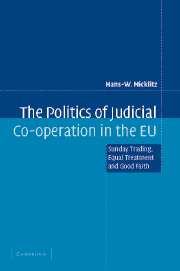Book contents
- Frontmatter
- Contents
- List of figures
- List of tables
- Preface and acknowledgments
- Table of cases
- Table of treaties
- Table of EC directives
- Table of statutes
- Table of statutory instruments
- List of abbreviations
- 1 Judicial activism and legal politics
- 2 The reconstruction of the Sunday trading cases
- 3 The reconstruction of the equal treatment litigation
- 4 The reconstruction of good faith in the control of unfair terms in consumer contracts
- 5 The limits of judicial activism and perspectives for legal politics
- Bibliography
- Index
5 - The limits of judicial activism and perspectives for legal politics
Published online by Cambridge University Press: 06 August 2009
- Frontmatter
- Contents
- List of figures
- List of tables
- Preface and acknowledgments
- Table of cases
- Table of treaties
- Table of EC directives
- Table of statutes
- Table of statutory instruments
- List of abbreviations
- 1 Judicial activism and legal politics
- 2 The reconstruction of the Sunday trading cases
- 3 The reconstruction of the equal treatment litigation
- 4 The reconstruction of good faith in the control of unfair terms in consumer contracts
- 5 The limits of judicial activism and perspectives for legal politics
- Bibliography
- Index
Summary
In 1995, Chalmers, after ten years’ experience with the Single European Act, wrote:
The language of economic constitution has been more extensively articulated than that of civil and political freedoms. If this base were eroded very real dilemmas would be posed to the future jurisdiction and authority of the Court of Justice, and it might be that the integrationist cause will in future need strong legislators rather than strong judges.
If his reading is correct, the European legal order remains far removed from being the ‘constitutional charter’ the ECJ has read into the EC Treaty. In light of the findings from the three case studies in this book, I will argue that Europe more than ever needs strong judges to whom cases may be referred not only through the workings of market forces but also by competent public interest groups. However, unlike Lord Denning, I do not believe that the shaping of the European legal order can be left in the hands of the judiciary alone. The case studies provide ample evidence of the wisdom of judges, both UK and European, and of how far the judiciary can go in pushing for greater rights and more effective remedies, thus amply demonstrating the benefits as well as the limits of judicial activism. UK and European judges do not behave like legislators; they are well aware of the role and function politics will and must play in the furtherance of the European project.
- Type
- Chapter
- Information
- The Politics of Judicial Co-operation in the EUSunday Trading, Equal Treatment and Good Faith, pp. 424 - 502Publisher: Cambridge University PressPrint publication year: 2005



